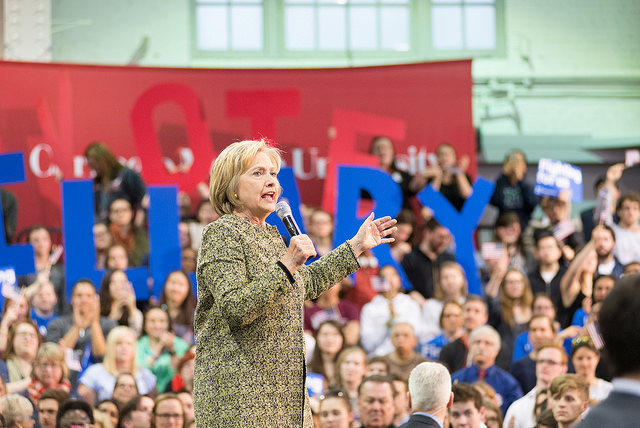
Federal Election Commission says that tax-exempt universities may provide cash stipends to unpaid campaign interns.
“Hungry collegiate political nerds” can now rejoice. At least that is what Ellen Weintraub, a Commissioner of the Federal Election Commission (FEC), says following an FEC decision that will allow universities to offer cash stipends for students who spend their summers working for political campaigns.
The FEC advisory opinion was requested from Hillary Clinton’s campaign after it hired an intern from DePauw University, a private college recognized as a tax-exempt non-profit. Normally, tax-exempt institutions are prohibited from making contributions to political campaigns.
DePauw’s program supports students who accept unpaid internships in non-profit organizations, start-up companies, or government offices. The program permits stipends up to $3,000 to offset “basic living expenses.”
Under this program, a DePauw student secured an unpaid summer internship with Hillary Clinton’s presidential campaign, and then the student received both a cash stipend as well as college credit. Afterwards, the Clinton campaign wanted FEC advice on whether the stipend was a campaign contribution that violated election law.
If DePauw’s stipend program had been declared a campaign contribution, both DePauw and the Clinton campaign could have potentially faced civil and criminal penalties under election law because corporations are barred from donating to candidates. Although the Supreme Court’s decision in Citizens United allowed for greater corporate political expenditures through so-called “super PACs,” direct contributions to campaigns remain regulated.
The advisory opinion stated that the stipend is not a contribution because it is provided for “bona fide educational objectives and not for the provision of personal services to federal campaigns.” Previous opinions focused less on the purpose of the “contribution” and led to a more strict interpretation prohibiting campaign work under such university programs.
To support its conclusion, the FEC highlighted language from DePauw stating that the program was designed for the purpose of education. Before approving the stipend, the university reviews the educational benefits of each position to ensure it will “provide an in-depth experience that is focused on the individual student’s learning objectives.”
The Commission also relied on the fact that DePauw requires students to complete two “extended studies” experiences to graduate, a requirement which may be fulfilled through internships.
The FEC distinguished between compensating the intern for her work and compensating the intern for travel and subsistence expenses. The fact that the stipend did not cover the entirety of the intern’s budgeted subsistence expenses helped the FEC determine that the stipend was designed to support the student’s goals rather than the campaign’s.
Commissioner Weintraub praised the decision as putting politically minded students on “even footing” with classmates who pursue other opportunities. Most presidential campaigns do not compensate interns for their work, except for Senator Bernie Sanders (I-VT) and the now-suspended campaign of Senator Rand Paul (R-KY).
The FEC also stated that the DePauw program was administered in a non-partisan fashion, not intended to advance political goals. Although a university may administer a program evenhandedly, that does not necessarily mean there will not be a partisan effect.
Some universities can skew heavily toward one political orientation or the other. For example, 85% of incoming Sarah Lawrence College students identify as liberal, whereas 93% of votes cast by those living on Liberty University’s campus went to Mitt Romney during the last presidential election.
It is unclear whether the FEC would approve a program identical to DePauw’s if the school had a skewed student body. The opinion emphasized that any change in facts or assumptions noted by the opinion could prevent another school from relying on it. However, the opinion highlighted the purpose and administration of the program rather than its effects, and did not examine the political leanings of the student body or administration.
Like DePauw, both Sarah Lawrence and Liberty are tax exempt under section 501(c)(3) of the tax code, a fact that the FEC relied upon in determining that the purpose of DePauw’s program was educational. Such 501(c)(3) organizations do not pay federal taxes, and individuals who make donations to them can claim such donations as tax deductions. By contrast, donations to political candidates are not deductible.
If subsidies for campaign internships were permitted at schools with student bodies that were skewed in a highly partisan direction, donations to these schools could be used to sponsor internship programs that overwhelmingly support one political party. Unlike a campaign contribution, funding such an internship program could be tax deductible. This would essentially amount to the government subsidizing political campaigns through the tax code.
When the government lowers taxes for engaging in certain behavior, such as funding an internship program, it is called a “tax expenditure.” Rather than tax a potential donor and distribute the money to a tax-exempt entity, the government simply does not collect the tax if the donor gives money directly to a tax-exempt group. Although the government is not directly paying for the behavior, both liberal and conservative groups view such programs as if the government funded the activity itself.
Had the FEC ruled differently, DePauw could have lost its tax-exempt status and had to pay additional penalties under tax law. Organizations exempt under section 501(c)(3) are prohibited from campaign activities such as contributions and endorsements, but recent guidance from the IRS does not address funding student internships. That guidance states that non-partisan voter education or registration activities are permitted under current tax regulation, but those that have the effect of favoring a group of candidates are prohibited.



